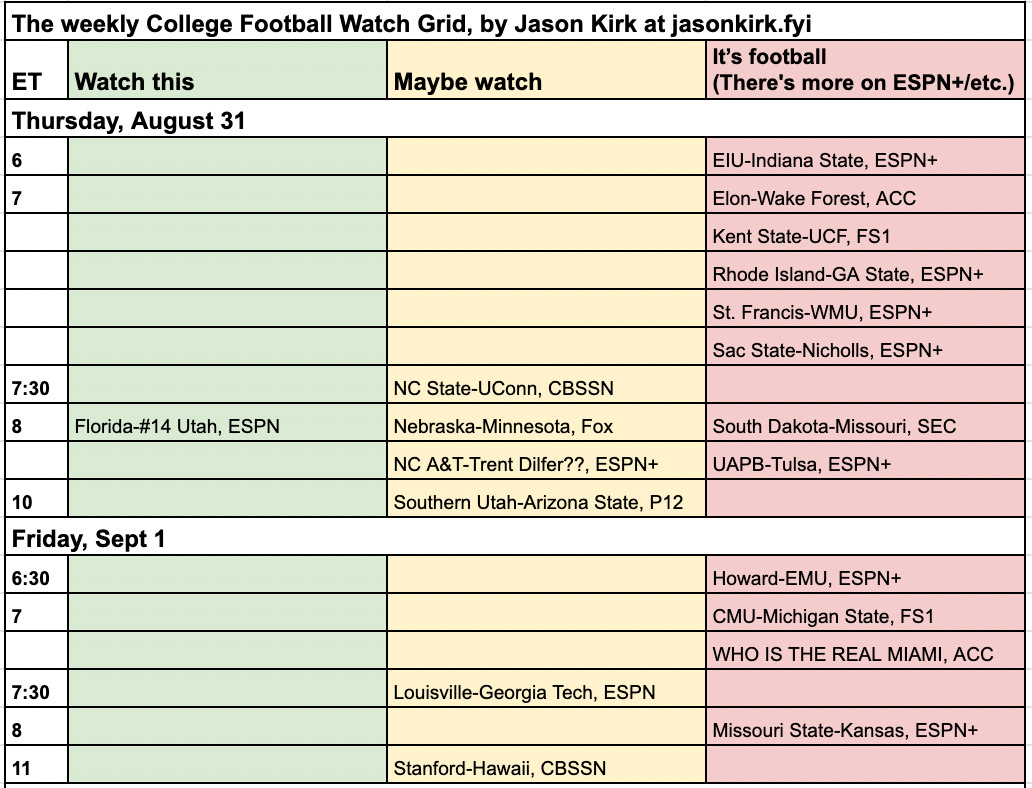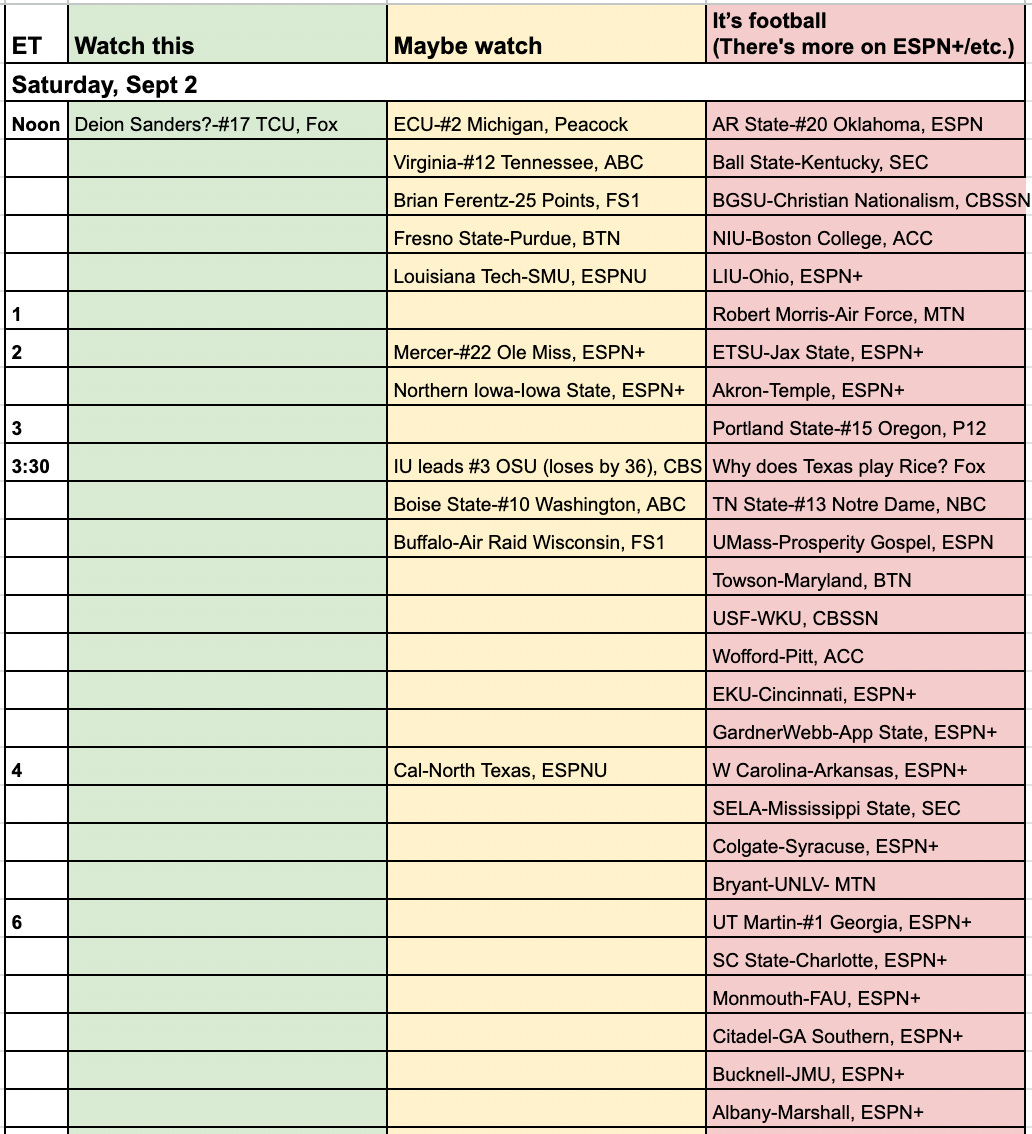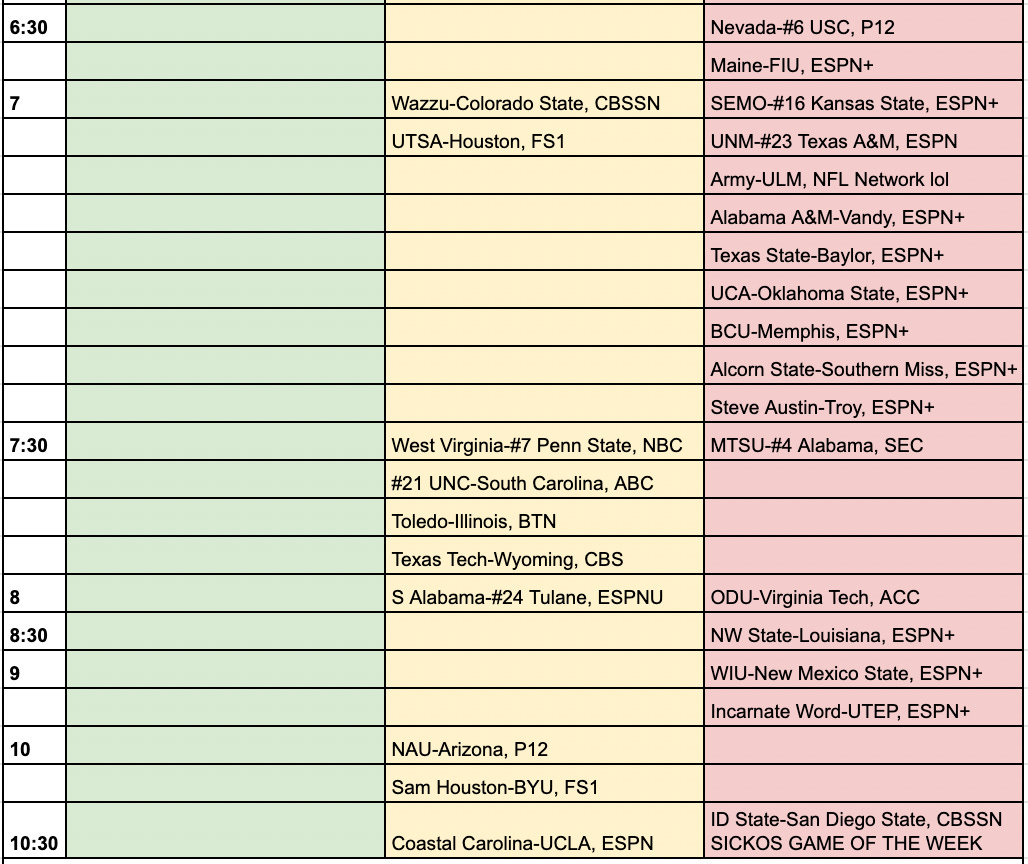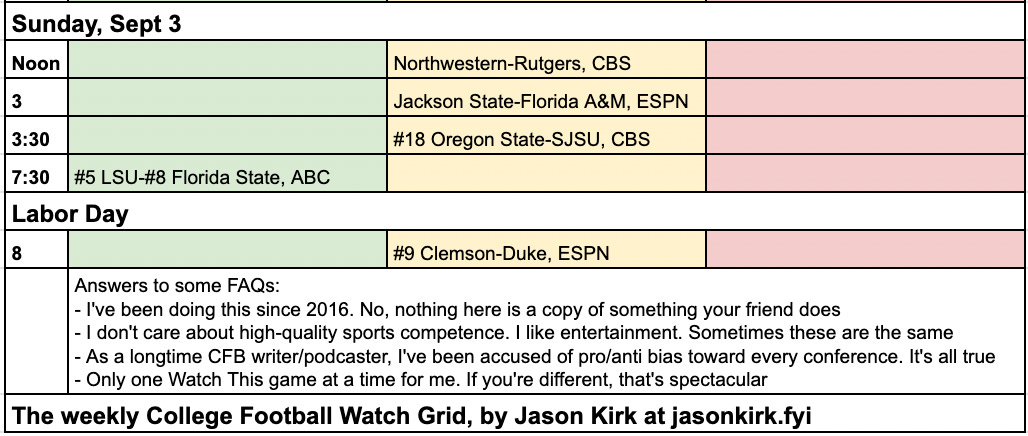Watch Grid: The end has always been nigh
"But about that day and hour, no one knows."
Since 2016, I’ve put together this weekly CFB schedule guide called the Watch Grid, the most popular sports thing I write. Since I’m sharing it for free, some people have kindly asked how they can tip. Here’s the answer:
My debut novel approaches, with orders hopefully available during football season. I’ll share much more information later, but for now, that math is: I send you 15+ weekend guides, and you order a ~$15 book that’d be worth your while even if I hadn’t. (Those of you pledging money to this Substack: I greatly appreciate the thought, but won’t touch that cash. Book or bust!)
To be extra sure you don’t miss it, sign up for updates from Shutdown Fullbooks, the internet’s only book publisher. (It’ll also be available via Amazon, your local book shop, and wherever else.)
It’s Week 1, so this will look different than it does in later weeks. The schedule’s huge, plus I’m gonna yammer for a while. It’ll be less artsy and more user-friendly next time. Thanks.
I’m writing this on Monday night, August 28. As of now, the Pac-12 has four members for 2024. Two might leave for the ACC, which I’d consider the dumbest move in realignment history (especially if the omniverse-brain reason would be conjuring some money in order to coddle Florida State for a while), albeit not the worst or most damaging.
With the Super League era seemingly upon us, as Fox and ESPN tear apart century-old regionality just so a few men in suits can buy more expensive suits, many fans have taken to viewing 2023 as a last stand for college football, a final revel before the end.
Shit, we’ll even start Week 1’s five-day extravaganza by celebrating the old days when capitalism happened to align with upstarts seizing status by merit:
Utah, the first to expose the modern era’s “power conference” lie, gets to host a three-time national champion in the season’s first marquee event. The Utes, once a defiant light amid BCS apocalypticism, are now slated to survive the next cataclysm as members of the third most stable conference, the Big 12, whose end was always extremely nigh.
An offseason dominated by talk of Colorado is surely a sign of impending calamity. And Deion Sanders’ roster-flipping experiment takes New College Football logic to such an extreme, only a liar would declare the Buffaloes’ opening game anything less than must-watch.
If the experiment works, it’ll be how everything will go all the time, as traditionalists beg the Rocky Mountains to fall upon them. It’d truly change things, though then again, every offseason’s frantic shuffle would just end with … the best programs having the best players.
But Colorado’s been a game-changer before, and we survived. Perpetually the Leroy Jenkins of realignment, the there-and-back-again Buffaloes were the first power to realign during the 2010s frenzy that convinced everyone to fancast the four 16-team conferences surely about to abandon the NCAA any second now. (That’ll happen, but it should’ve already happened 70 years ago.)
And Bill McCartney’s ‘80s Colorado overhaul wasn’t as frenzied as Deion’s, but only because there wasn’t a transfer portal back then. McCartney took up national recruiting decades before that became mandatory for every contender, scrapped offensive schemes left and right, and initially offered little other than a Charismatic certainty that nearly word-for-word matched his Boulder pulpit’s current prophet. (McCartney changed things forever until he didn’t, so he started a religious movement that’d save Evangelicalism until it didn’t. Much more on that another time. Promise.)
Hey, did you know McCartney was a Schembechler Catholic? Speaking of those:
This week, before serving the first leg of the funniest three-week suspension in history (good luck as a 35.5-point favorite against East Carolina), Jim Harbaugh delivered a self-assigned State of the Sport Address. He’s right that colleges should’ve figured out revenue-sharing agreements with athletes by now, just as such voices were right in the 1950s, when schools like Michigan still considered athletic scholarships to be world-ending — even as those athletes filled 90,000-seat stadiums. The wonder isn’t that this bullshit-since-the-1880s business model is untenable, but that nobody’s figured out how to make it collapse.
And if the Final Year Of College Football ends with a Michigan championship, it won’t be the first time.
In 1904, the Wolverines claimed their fourth national title. They’d turned a formerly Northeastern concern among private schoolers into big business for big schools across big regions, dominating a sport that’d been endangered for decades. It took nothing less than President Teddy Roosevelt convening a proto-NCAA to (somewhat) reign in the sport’s insane violence for a large enough portion of America to accept the guilty pleasure indefinitely.
The 2020s isn’t the first decade in which media companies get to treat competitions and traditions like assets. This decade is the product of the 1980s (when colleges sued TV rights away from the NCAA’s monopoly), which was the product of the ‘50s (when the organization founded on limiting violence doubled down on its taste for money, first acquired via its basketball-tournament business).
After that 1984 Supreme Court decision, one of the first literally made-for-TV college events was the 1987 Sunkist Fiesta Bowl, when the formerly second-rate postseason game managed to win a bidding war for No. 1 Miami and No. 2 Penn State, paying more than double its usual $1.1 million payout. That meant NBC could bill the game as an extremely rare Actual National Championship.
But because of TV-enhanced bowl contracts that greased the right palms, the following decade would include undefeated teams like 1994 Penn State missing out on title shots, plus three other disputed championships (each the end of the world), leading to the even more palm-greasing BCS (also the end of the world).
Though fans, players, and coaches had wanted official title games for over a century by that point, the lesson was the same as always: College football does not change until someone gets paid, at which point it changes dizzyingly instantly.
Three years after the 1987 Fiesta Bowl, the Big Ten agreed to become nominally inaccurate by adding that game’s champion, Penn State, in order to approach East Coast media markets. It’s wild to think a team in Central Pennsylvania was a stretch for the Midwestern conference, but once your knob goes to 11, why not 32? Why stop yourself until everything else stops first?
Penn State and West Virginia have played 59 times since 1904, but this will be their first meeting since the SEC and Big Ten kickstarted the Great Television Markets Tribulation in the early ‘90s.
The semi-logical conclusion of the Big Ten’s eastward campaign produced the all-time pinnacle of realignment comedy: the addition of Rutgers, which has somehow spent the decade after the move becoming even less prepared for it.
Rutgers: Now there’s a herald of the world eater.
In 1869, the school participated in the brawl we’ve all decided to consider the first American football game. If it’d been up to faculty, it would’ve been the last American football game. (“You will come to no Christian end,” one professor famously warned, outraged by the bloody spectacle.) The academics nearly got their way, with zero intercollegiate games played in 1871, because the end has been nigh since the very beginning.
A few years prior, some English guy named John Nelson Darby invented the concept of the Rapture, the idea that Jesus’ Second Coming will be preempted by a different mysterious event, one not about God restoring earth, but about Christians abandoning it. It was far from the world’s first apocalyptic prediction, but it’s the one that’s driven the most people insane.
Just like college football, the Rapture spread throughout America and damaged psyches from the mid-1800s through the 2020s, with each wave of young people (in certain kinds of churches) brainwashed into considering themselves the final generation.
College football is an impossible thing that still exists for a simple reason: It makes so many people happy and/or angry that their money funds it, decade after decade. It has always been on one last leg or another, the apocalypse has always been imminent within our lifetimes, and I’ll see you next Saturday.
(To be clear, I hope Oregon State or Washington State wins the Playoff, develops drunken Mountain West rivalries, and never looks back.)
We talked about THE CONSTANTLY IMPENDING END on the Vacation Bible School Podcast’s Patreon feed, ranking Rapture movies by tolerability. Pre-Left Behind Rapture movies, that is, though Left Behind made its way into our review roundup of other Evangelical movies, including t h e worst film ever made.







Okay, I will buy this novel so long as you promise that you are going to write the Rub Some Church On It book in due time....